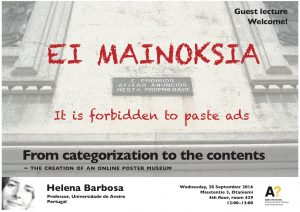PhD Course at the division of Urban and Regional Studies, KTH27th of April to 4th of May 2017The study of the city has undergone a transformation during the past ten years integrating ever wider theoretical perspectives from anthropology, cultural geography, political economy, urban sociology, and regional and city planning, and expanding its attention to the city as physical, architectural and virtual form. An emphasis on spatial relations and consumption as well as urban planning and design decision-making provides new insights into material, ideological and metaphorical aspects of the urban environment. Reliance on ethnography of space and place allows researchers to present an experience-near account of everyday life in urban housing or local markets, while at the same time addressing macro-processes such as globalization and the new urban social order.This course sketches some of the methodological and theoretical implications of the ethnographic study of the contemporary city using anthropological tools of participant observation, field notes, behavioral mapping, and theories of space and place to illuminate spaces in modern/post-modern cities and their transformations. In doing so, the course underscores links between the shape, vision and experience of cities and the meanings that their citizens read off screens and streets into their own lives.The course is developed in collaboration between the Center for the Future of Places, KTH and the division of Urban and regional Studies.The course is 3 ects with beforehand reading, 5 days in Stockholm and a written assignment to be handed in afterwards.Course objectives:After completing the course, the student will:– Be able to employ ethnographic methods to study phenomena of place and space– Be able to present experience-near accounts of everyday situated life, while at the same time addressing macro-processes such as globalization and the new urban social order.– Display a comprehension of the variegated ways through which contemporary urban experience is mediated.Participants need to be accepted into a PhD program in planning studies, urban and regional studies, or a related field.Grading: P/FApplications and questions:By email to Jonathan Metzger, jonathan.metzger@abe.kth.se.Final reading list will be provided in the beginning of April.Preliminary Schedule:27th of April What constitutes the anthropology of space and place? How is it different from a geography of space and place? Why would this be a helpful body of theory and methodology for my research and scholarly development?Introduction: The Anthropology of Space and PlaceSocial co-production of scape28th of April Social Production of Space: History, Political Economy, Planning and PowerIntroduction to fieldwork: Participant Observation and Field notes as a Method for Understanding the Social Construction of Space2nd of May Social Construction of Space: Race, Class and GenderIntroduction fieldwork: Behavioral Mapping4th of May Presentation and final discussionCourse leader: Setha LowSetha Low received her Ph.D. in Cultural Anthropology from the University of California, Berkeley. She started her career as an Assistant and Associate Professor of Landscape Architecture and Regional Planning, City and Regional Planning, and Anthropology at the University of Pennsylvania. Dr. Low is currently Professor of Environmental Psychology, Geography, Anthropology, and Women’s Studies, and Director of the Public Space Research Group at The Graduate Center, City University of New York where she teach courses and trains Ph.D. students in the anthropology of space and place, urban anthropology, culture and environment, and cultural values in historic preservation. Her most recent books include: Politics of Public Space (2006 Routledge with Neil Smith), Rethinking Urban Parks: Public Space and Cultural Diversity (2005, University of Texas Press with S. Scheld and D. Taplin), Behind the Gates: Life, Security and the Pursuit of Happiness in Fortress America (2004, Routledge), The Anthropology of Space and Place: Locating Culture (2003, Blackwell with D. Lawrence-Zuniga), On the Plaza: The Politics of Public Space and Culture (2000, University of Texas), Theorizing the City: The New Urban Anthropology Reader (1999, Rutgers University Press), Place Attachment (1992, Plenum with I. Altman). Her current research is on the impact of private governance on New York City coop residents, working on a collaborative project with Dolores Hayden on Spatial Methods and Public Practices funded by CASBC at Stanford, and is writing a book entitled Spatializing Culture: An Anthropological Theory of Space and Place.Jonathan Metzger, (Docent, PhD)Associate Professor / UniversitetslektorDirector of Postgraduate Research StudiesDivision of Urban and Regional StudiesKTH – Royal Institute of TechnologyStockholm, Swedene-mail: jonathan.metzger@abe.kth.setelephone: +46-(0)8-7907905cell: +46-(0)70-4451593
Category Archives: Lecture
Talk by Jussi Parikka: Inventing Pasts and Futures: Speculative Design and Media Archaeology
Welcome to Doctor of Arts Seminar at Media Lab Thursday 2 March 2017:
Jussi Parikka:
Inventing Pasts and Futures:
Speculative Design and Media Archaeology
Abstract: This talk will expand some themes in media archaeology in relation to speculative design. In short, the talk will elaborate how the temporal horizon of speculative design can also be worked through historical materials and past themes, bringing the two fields in proximity. Besides some theoretical points, the talk will elaborate on situated practices such as the Maker Lab in the Humanities (at University of Victoria, Canada) as well as recent projects such as the Media Archaeology of Ingenious Devices which we (myself together with Ayhan Aytes) set up at the Istanbul Design Biennial past Autumn. The project expanded on media archaeologies of Middle East automata into versions of “what if” history as well as geopolitically alternative questions about speculation.
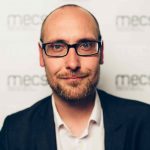 Biography: Dr Jussi Parikka is Professor at the Winchester School of Art (University of Southampton) and Docent at University of Turku. His various books have addressed a wide range of topics relevant to a critical understanding of network culture, aesthetics and media archaeology of contemporary technologies. The books include the media ecology-trilogy Digital Contagions (2007, 2nd. ed 2016), the award-winning Insect Media (2010) and most recently, A Geology of Media (2015), which addresses the environmental contexts of technical media culture.
Biography: Dr Jussi Parikka is Professor at the Winchester School of Art (University of Southampton) and Docent at University of Turku. His various books have addressed a wide range of topics relevant to a critical understanding of network culture, aesthetics and media archaeology of contemporary technologies. The books include the media ecology-trilogy Digital Contagions (2007, 2nd. ed 2016), the award-winning Insect Media (2010) and most recently, A Geology of Media (2015), which addresses the environmental contexts of technical media culture.
In addition, Parikka has published such books as What is Media Archaeology (2012) and edited various books, recently Writing and Unwriting (Media) Art History (2015, with Joasia Krysa) on the Finnish media art pioneer Erkki Kurenniemi. He is also the co-editor of Across and Beyond: – A transmediale Reader on Post-digital Practices, Concepts, and Institutions (Sternberg Press, 2016, co-edited with Ryan Bishop, Kristoffer Gansing and Elvia Wilk).
Parikka’s website/blog: http://jussiparikka.net
Find him on Twitter as: @juspar
DOM-L0003 Doctor of Arts at Media Lab Seminar
Responsible teacher: Prof. Lily Díaz-Kommonen
TIME: Thursday 2 March 2017, from 17:00 – 19:00
LOCATION: Miestentie 3 (Otaniemi), 4th floor, room 426.
Guest lecture at Media Lab DA seminar: Timo Honkela
Welcome to the seminar lecture 8th December from 17:00 at Miestentie:
THE BIG PICTURE OF HUMAN-MACHINE COEVOLUTION
by Timo Honkela, University of Helsinki
ABSTRACT
Invention of linguistic communication, symbolic representation, writing and printing have been important steps in human cultural evolution. Computers and networks have have enabled further developments. During the past fifty years human knowledge and skills have progressed increasingly with the help of computers. The knowledge and skills of digital systems have been usually limited by the knowledge and imagination of humans. There are exceptions to this and they are increasing because of the use of machine learning, evolutionary algorithms and other adaptive systems, growing amount of open data, and computational resources becoming close to human capacities. Clear risks related to these developments. For instance, large proportion of professions will be taken over by computers and robots. This is, however, a limited problem if the development leads into improved understanding of our societies and decision making, improved mutual understanding, and better use of resources. This kind of cultural evolution can lead into very beneficial developments. We can discuss what kind of design-in-the-large is needed to reach such a positive track.
SHORT BIO: TIMO HONKELA
It may be fair to say that professor Timo Honkela has unusually wide scientific and work experience. He has served as a professor earlier in the University of Art and Design Helsinki, Media Lab and Helsinki University of Technology, Laboratory of Information and Computer Science and currently at the University of Helsinki, Department of Modern Languages. Honkela’s research and development work has covered since 1980s areas such as natural language processing, artificial neural networks, participatory media art, visual information retrieval, text mining, socio-cognitive modeling, and analysis of complex societal phenomena.
Stephen Mayes lectures
Welcome to attend two lectures given by Stephen Mayes on Friday, November 25 at Photography premises, 9th floor:
10 am: Building a Professional Photographic Practice in the New Media World
1 pm: Digital Trends and Computational Photography
Stephen Mayes is a free lance writer and curator. He has been Secretary to the International Jury of World Press Photo Foundation from 2004–2012, and CEO at VII Photo agency from 2008–2013. The new MA students of Photography study program read his article The Next Revolution in Photography last spring as part of their application process. Now you have a unique chance to meet him live! The lectures are part of our course On Photography.
The lectures are open to other media and art students as well.
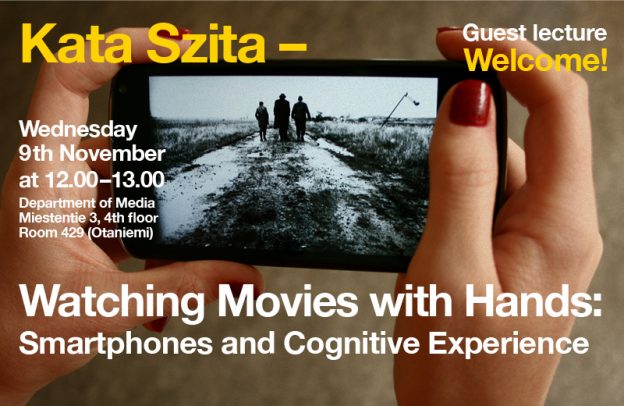
GUEST LECTURE: Kata Szita: “Watching Movies with Hands: Smartphones and Cognitive Experience”
Welcome to an open lunch lecture
Watching Movies with Hands:
Smartphones and Cognitive Experience
by Kata Szita
WEDNESDAY 9 NOVEMBER 2016
at 12.00 – 13.00
Department of Media
Miestentie 3, Otaniemi
4th floor, room 429
Abstract:
Smartphones are often described as something that extends the user’s body, but what does this contact mean in terms of film experience? The emerging discipline, which deals with the application, advantages and drawbacks, social and economic effects of mobile usage is often limited either to user behavior (such as forms of communication or consumption) or to the interface (interface design, affordances), but rarely focuses on the cognitive impact of the user-device interaction. Using interdisciplinary approaches, in my doctoral thesis I attempt to turn the spotlight on how this interaction affects film and video experience, and how it requires new viewing strategies from the users’ side, and potential new strategies from the content producers’ side.
The thesis borrows concepts from cognitive, behavioral, and developmental psychology in order to describe how spectators evolve with the new media environment, and what factors inform this development for a generation in the age of digital cinema and portable screens; it applies semantic and media archeological points of view to highlight the way smartphone interfaces remediate older media (among others the cinema screen); it turns to ecological psychology, game studies, and concepts around haptic interfaces to define the immersive and interactive nature of film experience within various virtual and physical spaces; and lastly, presents the empirical findings—the impact of smartphone film experience on physiological responses.
The empirical section of the thesis seeks answers to how audiovisual footages, such as mobile-distributed movies, commercials, and videos can communicate in the most effective way. In this experiment volunteers are asked to watch approximately 8-10 minutes’ footages of a set of English-speaking commercial movies on a smartphone, while their eye movements, heart rate, skin conductance, and pupil dilation is measured in correlation with their eventual interaction with the device/video player application. The experiment is being designed to measure what effects the screen size, the physical connection between the user’s body and the device, the multiple viewing options that mobile video players offer, and most importantly, the active environments in which smartphones are typically used have on attention, engagement, and the feeling of presence.
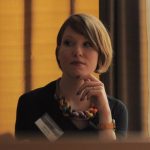 Kata Szita is a visiting researcher at the Department of Media at Aalto University, and a PhD candidate in Film Studies at the University of Gothenburg with an interest in neurocinematics, cognitive film studies, and empirical methods like eye tracking. In her PhD thesis she uses these approaches to describe the relocation of cinema onto smartphones, and investigates the role of social development in adapting to the newest viewing conditions. Besides having an extensive practical experience in filmmaking and television production, Szita holds a Master’s degree in Cinema and Media Studies and received her undergraduate education in Sociology and International Relations.
Kata Szita is a visiting researcher at the Department of Media at Aalto University, and a PhD candidate in Film Studies at the University of Gothenburg with an interest in neurocinematics, cognitive film studies, and empirical methods like eye tracking. In her PhD thesis she uses these approaches to describe the relocation of cinema onto smartphones, and investigates the role of social development in adapting to the newest viewing conditions. Besides having an extensive practical experience in filmmaking and television production, Szita holds a Master’s degree in Cinema and Media Studies and received her undergraduate education in Sociology and International Relations.
The lecture is open for all at Aalto University.
Welcome!
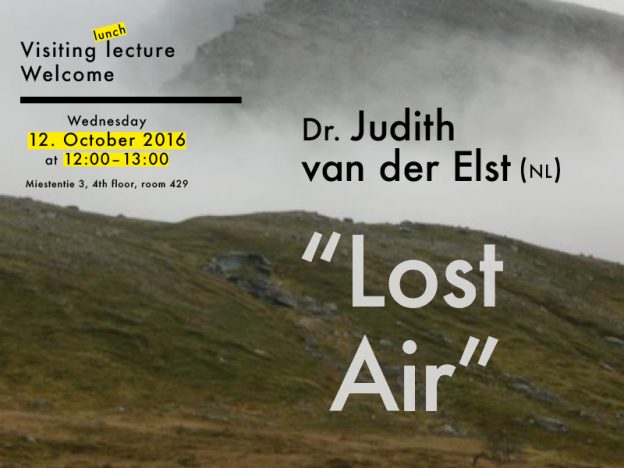
VISITING LECTURE: Dr. Judith van der Elst: “Lost Air”
Dr. Judith van der Elst: “Lost Air”
Wednesday 12. October 2016 / at 12:00–13:00
Miestentie 3, 4th floor, room 429 (Otaniemi)
Welcome to the open visiting lecture in the Department of Media!
“Over the last years I have spent considerable time in remote rural settings, where comfort taken for granted in urban contexts, such as drinking water from the tap and access to goods and services in general, is not always available. But after a while your values begin to change: the sounds of nature’s nightlife, the spectacle of dancing fireflies, the enveloping odor of the blooming acacia’s, all become part of a new order of essential components of living. This is embodied knowledge.
I have come to believe that the sensory richness of these places still provides top quality conditions for human life. As an archaeologist I am interested in how we can identify and understand our atmospheric heritage, conditions that may have become very rare in our industrialized world. However, standard methods in heritage management are unsuitable for the protection of such circulatory patterns and processes. In this lecture I advocate a shift in focus from design to minimize pollution to design for increasing ‘top quality’ sensory conditions to address a crucial problem in natural and cultural heritage.“
Judith van der Elst holds a Ph.D. in Anthropology (archaeology) from the University of New Mexico (USA) with a specialization in Geographical Information Sciences. She applies spatial and emerging technologies in the social sciences and humanities (E-Culture). Her interest is in diversity in spatial thinking and spatial reasoning and developing methodologies for understanding this diversity through cross-modal languages and novel pedagogies. She has collaborated on international heritage projects and conducted participatory projects working with traditional communities, crossing art, science, and technology. She also worked in heritage management, among others at the National Park Service, Chaco Culture, National Historical Park USA. Currently, she is an independent researcher and creative entrepreneur based in the Netherlands.
Doctor of Arts Seminar at Media Lab: A Study of Representations of Affections in Digital Era Media Archaeology of Affective Archive
Welcome to the first session of our Doctoral Seminar this semester.
Thursday 22. September 2016, from 17:00–19:00
Miestentie 3, OTANIEMI, 4th floor, room 429.
Hung Han Chen will present work on his doctoral dissertation on Affective Archives.
(See abstract below.)
Tervetuloa! Welcome!
Note that MA students are specially welcome to attend the presentation.
A Study of Representations of Affections in Digital Era.
Media Archaeology of Affective Archive.
Hung-Han Chen
This presentation discusses the representation of emotions in the digital era. My thesis is a media archaeology of representative affective media. I will present the introduction of my thesis that includes the research background, motivation, and research questions.
The main contribution of the thesis is the design of a tool that generates the representation of ontology of affects. The tool heavily depends on emotion theories in the digital era, therefore, my thesis is composed of studies of theories as well as practice.
The theoretical part of my thesis is influenced by affect theories and the affective turn in disciplines and discourses on feelings, emotions, and moods. The hypotheses and concepts of emotions are based on Henri Bergson and Gilles Deleuze’s theories. The practical outcomes of the thesis are digital tools that enable us to develop ontologies from various types of digital media archives including early 20th cinema samples. In these ontologies entities are used to represent complex emotions such as shame and personal digital footprint.
VISITING LECTURE: Helena Barbosa – From categorization to the contents: the creation of an on-line poster museum
From categorization to the contents:
the creation of an on-line poster museum
Wednesday 28. September 2016
at 12:00–13:00
Miestentie 3, 4th floor, room 429 (Otaniemi)
The University of Aveiro is at present developing a project involving the construction of an on-line poster museum, containing around 30,000 artifacts. Given the large number of posters in existence, and the great diversity of representations, this lecture describes the development of the project and the reasons behind the creation of “key topics,” which function as gateways to other related information on the web – metadata. It also presents the proposed key topics, considered as a tool that allows the visitor access to contents, not only from the perspective of traditional classifications and catalogue, but also from the point of view of design. It is presented a methodology that intended to privilege narratives over rules. In this case, narratives about the poster were made by ten designers when confronted with a request to select 44 posters among 1,962 samples of posters obtained from the collections of the National Library of Portugal (Biblioteca Nacional de Portugal) and from the University of Aveiro. The designers discourses, were analyzed, through the theoretical design model developed at the University of Aveiro, revealing each artifact relation inside the triangle authorship / technology / brief, its morphogenetic evolution and semantic dimension. Taking into account those contents the research aims to create an on-line poster museum to be accessible worldwide and contribute to the knowledge of the history of Portuguese design.
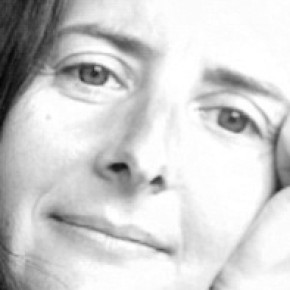 Helena Barbosa is a Professor of Design at the University of Aveiro, with interests on Portuguese design history, material culture, museology, museography, illustration and art. In addition to working with master’s and doctoral students as a supervisor, she has written extensively and has been invited to give lectures at national and international conferences, with articles in scientific journals, publishing several books. She is currently the keeper for the contents of an on-line poster museum, vice-chair of ID+ Research Institute in Design, Media and Culture, member of the editorial board of various international journals, and member of ICDHS.
Helena Barbosa is a Professor of Design at the University of Aveiro, with interests on Portuguese design history, material culture, museology, museography, illustration and art. In addition to working with master’s and doctoral students as a supervisor, she has written extensively and has been invited to give lectures at national and international conferences, with articles in scientific journals, publishing several books. She is currently the keeper for the contents of an on-line poster museum, vice-chair of ID+ Research Institute in Design, Media and Culture, member of the editorial board of various international journals, and member of ICDHS.
WELCOME!

